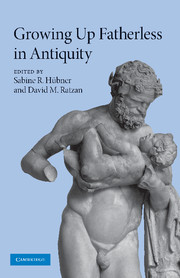Book contents
- Frontmatter
- Contents
- List of figures
- List of tables
- List of contributors
- Acknowledgments
- Note on abbreviations
- INTRODUCTION
- 1 Fatherless antiquity? Perspectives on “fatherlessness” in the ancient Mediterranean
- PART I COPING WITH DEMOGRAPHIC REALITIES
- 2 The demographic background
- 3 Oedipal complexities
- 4 Callirhoe's dilemma: remarriage and stepfathers in the Greco-Roman East
- 5 “Without father, without mother, without genealogy”: fatherlessness in the Old and New Testaments
- PART II VIRTUAL FATHERLESSNESS
- PART III ROLES WITHOUT MODELS
- PART IV RHETORIC OF LOSS
- Bibliography
- Index
5 - “Without father, without mother, without genealogy”: fatherlessness in the Old and New Testaments
Published online by Cambridge University Press: 30 July 2009
- Frontmatter
- Contents
- List of figures
- List of tables
- List of contributors
- Acknowledgments
- Note on abbreviations
- INTRODUCTION
- 1 Fatherless antiquity? Perspectives on “fatherlessness” in the ancient Mediterranean
- PART I COPING WITH DEMOGRAPHIC REALITIES
- 2 The demographic background
- 3 Oedipal complexities
- 4 Callirhoe's dilemma: remarriage and stepfathers in the Greco-Roman East
- 5 “Without father, without mother, without genealogy”: fatherlessness in the Old and New Testaments
- PART II VIRTUAL FATHERLESSNESS
- PART III ROLES WITHOUT MODELS
- PART IV RHETORIC OF LOSS
- Bibliography
- Index
Summary
The engagement of scholars of antiquity with the topic of “fatherlessness” is of high importance because the problem of fatherlessness presents a conspicuous gap in the otherwise well-studied field of the ancient family. However, a study on the topic should not be pursued simply on account of some desire to fill a historiographical lacuna. Instead, by entering into a dialogue with practicing social scientists, scholars of antiquity may be able to provide useful comparative data on this phenomenon, a collaboration which could in turn help us to understand better the manifold problems associated with modern fatherlessness. As we shall see, the New Testament and other contemporary, non-canonical texts represent a rich source of ancient data with respect to how the early Christian community understood and engaged with the problem of fatherlessness.
A quick survey of contemporary Christian writings reveals that fatherlessness is an increasingly contentious topic within several Christian denominations, since the modern phenomenon of children growing up without a father runs counter to the traditional Christian family image. Unsurprisingly, this state of affairs has occasioned many – often highly emotional – discussions in the Christian media, particularly in Anglo-American Evangelical circles. The inherent dependence of this discourse on the Bible as the normative authority of religion, which understands God as its “Father,” underscores the Biblical rootedness of the modern Christian, family-oriented model of society. However, this discourse is unable to represent fatherlessness in a fully defined manner.
- Type
- Chapter
- Information
- Growing Up Fatherless in Antiquity , pp. 83 - 102Publisher: Cambridge University PressPrint publication year: 2009
- 2
- Cited by

